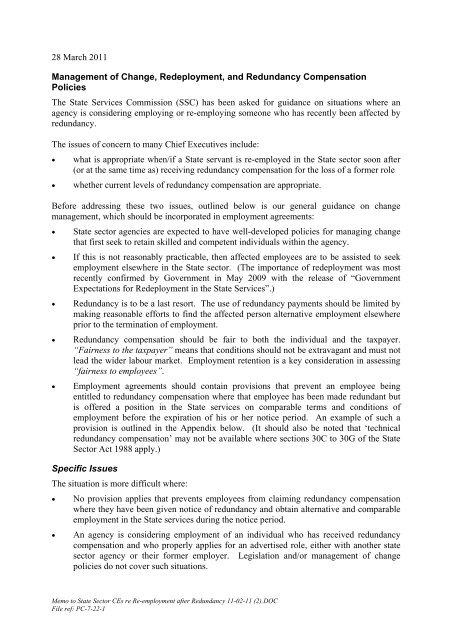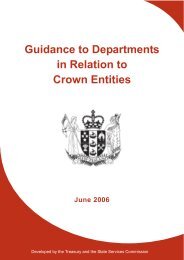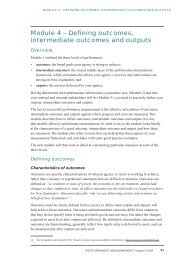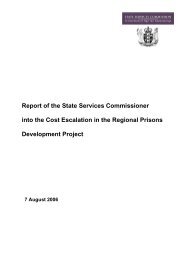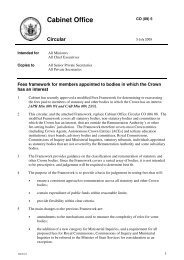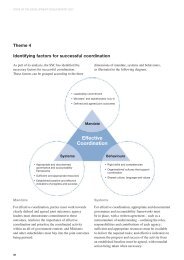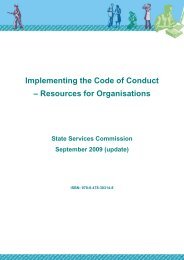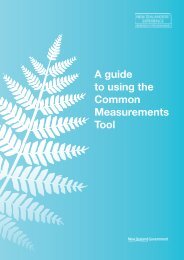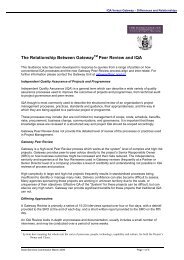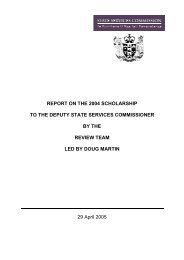Memo to State sector chief executives re re-employment after ...
Memo to State sector chief executives re re-employment after ...
Memo to State sector chief executives re re-employment after ...
You also want an ePaper? Increase the reach of your titles
YUMPU automatically turns print PDFs into web optimized ePapers that Google loves.
28 March 2011<br />
Management of Change, Redeployment, and Redundancy Compensation<br />
Policies<br />
The <strong>State</strong> Services Commission (SSC) has been asked for guidance on situations whe<strong>re</strong> an<br />
agency is considering employing or <strong>re</strong>-employing someone who has <strong>re</strong>cently been affected by<br />
<strong>re</strong>dundancy.<br />
The issues of concern <strong>to</strong> many Chief Executives include:<br />
<br />
<br />
what is appropriate when/if a <strong>State</strong> servant is <strong>re</strong>-employed in the <strong>State</strong> sec<strong>to</strong>r soon <strong>after</strong><br />
(or at the same time as) <strong>re</strong>ceiving <strong>re</strong>dundancy compensation for the loss of a former role<br />
whether cur<strong>re</strong>nt levels of <strong>re</strong>dundancy compensation a<strong>re</strong> appropriate.<br />
Befo<strong>re</strong> add<strong>re</strong>ssing these two issues, outlined below is our general guidance on change<br />
management, which should be incorporated in <strong>employment</strong> ag<strong>re</strong>ements:<br />
<br />
<br />
<br />
<br />
<br />
<strong>State</strong> sec<strong>to</strong>r agencies a<strong>re</strong> expected <strong>to</strong> have well-developed policies for managing change<br />
that first seek <strong>to</strong> <strong>re</strong>tain skilled and competent individuals within the agency.<br />
If this is not <strong>re</strong>asonably practicable, then affected employees a<strong>re</strong> <strong>to</strong> be assisted <strong>to</strong> seek<br />
<strong>employment</strong> elsewhe<strong>re</strong> in the <strong>State</strong> sec<strong>to</strong>r. (The importance of <strong>re</strong>deployment was most<br />
<strong>re</strong>cently confirmed by Government in May 2009 with the <strong>re</strong>lease of “Government<br />
Expectations for Redeployment in the <strong>State</strong> Services”.)<br />
Redundancy is <strong>to</strong> be a last <strong>re</strong>sort. The use of <strong>re</strong>dundancy payments should be limited by<br />
making <strong>re</strong>asonable efforts <strong>to</strong> find the affected person alternative <strong>employment</strong> elsewhe<strong>re</strong><br />
prior <strong>to</strong> the termination of <strong>employment</strong>.<br />
Redundancy compensation should be fair <strong>to</strong> both the individual and the taxpayer.<br />
“Fairness <strong>to</strong> the taxpayer” means that conditions should not be extravagant and must not<br />
lead the wider labour market. Employment <strong>re</strong>tention is a key consideration in assessing<br />
“fairness <strong>to</strong> employees”.<br />
Employment ag<strong>re</strong>ements should contain provisions that p<strong>re</strong>vent an employee being<br />
entitled <strong>to</strong> <strong>re</strong>dundancy compensation whe<strong>re</strong> that employee has been made <strong>re</strong>dundant but<br />
is offe<strong>re</strong>d a position in the <strong>State</strong> services on comparable terms and conditions of<br />
<strong>employment</strong> befo<strong>re</strong> the expiration of his or her notice period. An example of such a<br />
provision is outlined in the Appendix below. (It should also be noted that ‘technical<br />
<strong>re</strong>dundancy compensation’ may not be available whe<strong>re</strong> sections 30C <strong>to</strong> 30G of the <strong>State</strong><br />
Sec<strong>to</strong>r Act 1988 apply.)<br />
Specific Issues<br />
The situation is mo<strong>re</strong> difficult whe<strong>re</strong>:<br />
<br />
<br />
No provision applies that p<strong>re</strong>vents employees from claiming <strong>re</strong>dundancy compensation<br />
whe<strong>re</strong> they have been given notice of <strong>re</strong>dundancy and obtain alternative and comparable<br />
<strong>employment</strong> in the <strong>State</strong> services during the notice period.<br />
An agency is considering <strong>employment</strong> of an individual who has <strong>re</strong>ceived <strong>re</strong>dundancy<br />
compensation and who properly applies for an advertised role, either with another state<br />
sec<strong>to</strong>r agency or their former employer. Legislation and/or management of change<br />
policies do not cover such situations.<br />
<strong>Memo</strong> <strong>to</strong> <strong>State</strong> Sec<strong>to</strong>r CEs <strong>re</strong> Re-<strong>employment</strong> <strong>after</strong> Redundancy 11-02-11 (2).DOC<br />
File <strong>re</strong>f: PC-7-22-1
In these situations, a single inflexible approach will not necessarily meet the justice of every<br />
situation and employers will need <strong>to</strong> exercise sound judgement. Employees who <strong>re</strong>ceive<br />
<strong>re</strong>dundancy compensation in good faith and who have not obtained an offer of <strong>employment</strong><br />
have no certainty (even if they have begun <strong>to</strong> apply for other positions during the notice period)<br />
that they have another position <strong>to</strong> go <strong>to</strong>, and suffer a loss of continuity in <strong>employment</strong>. Such<br />
employees will have properly <strong>re</strong>ceived <strong>re</strong>dundancy compensation and will often use the<br />
compensation <strong>to</strong> protect their position.<br />
Whe<strong>re</strong>, however, an employee <strong>re</strong>ceives a job shortly <strong>after</strong> <strong>re</strong>ceiving <strong>re</strong>dundancy compensation<br />
the following may help <strong>to</strong> shape your thinking and <strong>to</strong> ensu<strong>re</strong> that the decision <strong>to</strong> make or not<br />
make an appointment in these circumstances is robust and defendable.<br />
SSC guidance on <strong>re</strong>-<strong>employment</strong> post <strong>re</strong>dundancy:<br />
<br />
<br />
The SSC expects Chief Executives <strong>to</strong> ensu<strong>re</strong> that good candidates a<strong>re</strong> not bar<strong>re</strong>d from <strong>re</strong><strong>employment</strong><br />
because they have <strong>re</strong>ceived compensation for a <strong>re</strong>cent loss of <strong>employment</strong>,<br />
but the decision <strong>to</strong> proceed with an <strong>employment</strong> offer must be balanced against the<br />
questions of fairness <strong>to</strong> the taxpayer and <strong>re</strong>sponsible use of <strong>re</strong>sources.<br />
If you a<strong>re</strong> considering offering <strong>employment</strong> <strong>to</strong> someone <strong>re</strong>cently made <strong>re</strong>dundant, on<br />
similar or better terms and conditions than they p<strong>re</strong>viously enjoyed in the <strong>State</strong> sec<strong>to</strong>r, we<br />
would advise you <strong>to</strong> consider all <strong>re</strong>levant fac<strong>to</strong>rs and <strong>to</strong> look for possible options that<br />
avoid “double dipping”. While the<strong>re</strong> is a legal obligation <strong>to</strong> <strong>re</strong>cruit the person best suited<br />
<strong>to</strong> the position, if the time elapsed since the employee left their p<strong>re</strong>vious role is short you<br />
might consider ag<strong>re</strong>eing some arrangement with the employee like deferring the<br />
appointment if this is feasible or for the applicant <strong>to</strong> <strong>re</strong>pay part of the compensation <strong>to</strong> the<br />
former <strong>State</strong> sec<strong>to</strong>r employer. The mo<strong>re</strong> senior the position the mo<strong>re</strong> appropriate such an<br />
arrangement may be.<br />
We a<strong>re</strong> NOT advocating that anyone made <strong>re</strong>dundant should not be <strong>re</strong>-employed, but rather<br />
that the taxpayer should not pay twice for the same period of time.<br />
Best practice in both the private and public sec<strong>to</strong>rs is for <strong>re</strong>dundancy compensation <strong>to</strong> be a<br />
capped entitlement, sometimes based on cur<strong>re</strong>nt service, but becoming less so. We note that<br />
some entitlements cur<strong>re</strong>ntly provide for <strong>re</strong>dundancy payments based in part on an employee’s<br />
family status - that may be discrimina<strong>to</strong>ry.<br />
However, in considering any approach <strong>to</strong> this matter you must always pay due <strong>re</strong>gard <strong>to</strong> the<br />
applicable <strong>employment</strong> ag<strong>re</strong>ement and any other specific legal <strong>re</strong>qui<strong>re</strong>ments.<br />
The SSC <strong>employment</strong> <strong>re</strong>lations advisors a<strong>re</strong> available <strong>to</strong> provide advice and support <strong>to</strong><br />
agencies in this a<strong>re</strong>a if <strong>re</strong>qui<strong>re</strong>d.<br />
<strong>Memo</strong> <strong>to</strong> <strong>State</strong> Sec<strong>to</strong>r CEs <strong>re</strong> Re-<strong>employment</strong> <strong>after</strong> Redundancy 11-02-11 (2).DOC 2
Appendix<br />
Management of Change Clause<br />
1 In the event of the employee's position ceasing <strong>to</strong> exist, <strong>after</strong> consultation with the<br />
employee, the employer shall give the employee at least one month's notice of<br />
termination of <strong>employment</strong>, on salary. (This shall be instead of, not in addition <strong>to</strong>, the<br />
notice period provided in Clause ... above.)<br />
2 During the notice period, subject <strong>to</strong> the provisions of the <strong>State</strong> Sec<strong>to</strong>r Act 1988, both the<br />
employer and the employee shall make <strong>re</strong>asonable efforts <strong>to</strong> locate suitable alternative<br />
<strong>employment</strong> for the employee including in the following a<strong>re</strong>as:<br />
<br />
<br />
within the Public Service<br />
within any other part of the <strong>State</strong> sec<strong>to</strong>r (which term shall include Crown entities,<br />
Crown companies and <strong>State</strong> Owned Enterprises)<br />
in the organisation acquiring some or all of the business of the employer whether or<br />
not that organisation is within the <strong>State</strong> sec<strong>to</strong>r (whe<strong>re</strong> the position ceases <strong>to</strong> exist<br />
due <strong>to</strong> the part of the employer’s business in which the employee's position is<br />
situated being sold or transfer<strong>re</strong>d).<br />
3 In the event that a <strong>re</strong>asonable offer of <strong>employment</strong> is <strong>re</strong>ceived by the employee prior <strong>to</strong><br />
the expiration of the notice period the employer’s <strong>re</strong>sponsibilities under these provisions<br />
shall be fulfilled, and the employee shall not be entitled <strong>to</strong> any payment under Clause ...<br />
For the purposes of this provision, the offer of a position with duties and <strong>re</strong>sponsibilities<br />
commensurate with the employee’s skills, qualifications and attributes, in substantially<br />
the same general locality or one within <strong>re</strong>asonable commuting distance, with terms and<br />
conditions of <strong>employment</strong> that a<strong>re</strong> overall no less favourable shall constitute a <strong>re</strong>asonable<br />
offer.<br />
4 The parties may ag<strong>re</strong>e <strong>to</strong> any other arrangement as an alternative <strong>to</strong> the provisions<br />
contained in Clauses ...<br />
Whe<strong>re</strong> no <strong>re</strong>asonable offer of <strong>employment</strong> is made by expiry of the notice period, and no<br />
alternative arrangements have been ag<strong>re</strong>ed, the employee shall be offe<strong>re</strong>d a <strong>re</strong>dundancy<br />
payment equivalent <strong>to</strong> th<strong>re</strong>e months’ <strong>re</strong>muneration at the rate payable under this<br />
Ag<strong>re</strong>ement.<br />
<strong>Memo</strong> <strong>to</strong> <strong>State</strong> Sec<strong>to</strong>r CEs <strong>re</strong> Re-<strong>employment</strong> <strong>after</strong> Redundancy 11-02-11 (2).DOC 3


